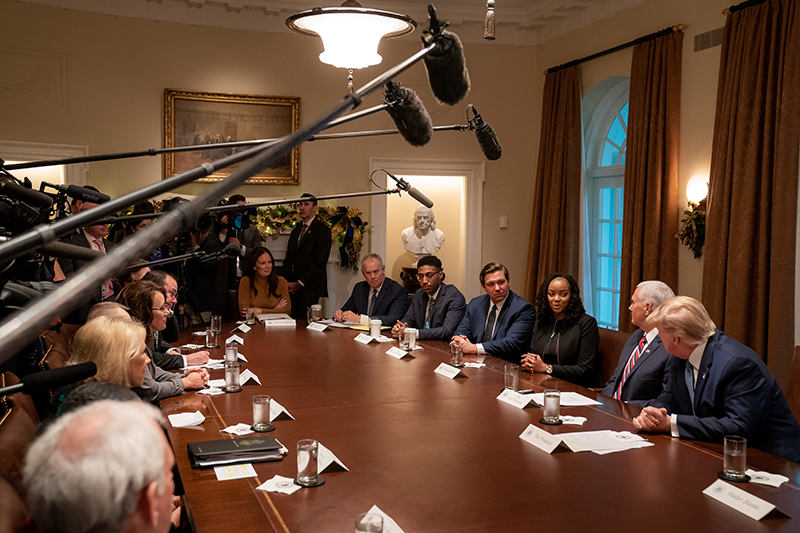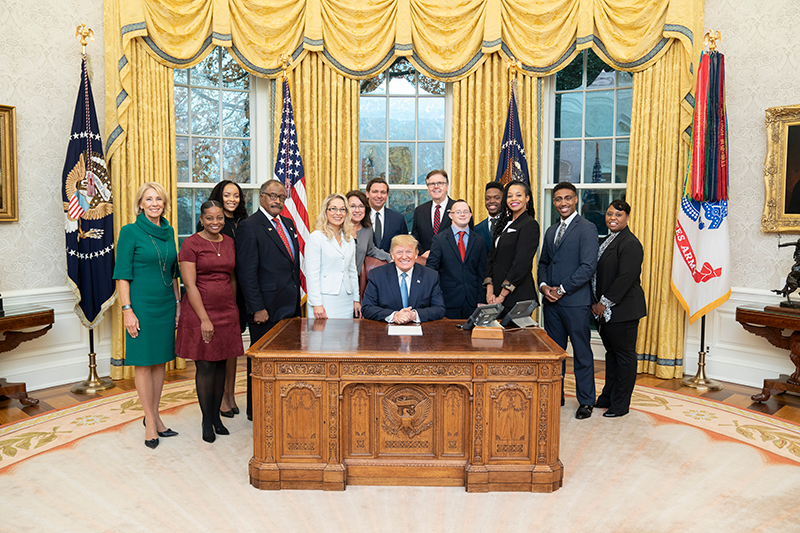“School choice opens up doors that would otherwise be slammed shut. As a young African American male in a low-income neighborhood it’s more likely I would be a dropout of high school or even in prison at this very moment rather than speaking before you.”
—Myles Slade-Bowers at the Education Empowerment Roundtable
It’s not every day a teenager sits at a White House roundtable with the President, Vice President, and other high-level political officials. For Myles Slade-Bowers, a junior at Bishop McDevitt High School in Harrisburg and former Commonwealth Foundation intern, that event took place earlier this month. As he shared his story, President Trump and others around the table were visibly moved. Myles’ testimony was yet another powerful example of how Pennsylvania scholarship programs save lives.

Official White House Photos by Shealah Craighead
L-R facing the cameras, Speaker of the Pa. House Mike Turzai, Myles Slade-Bowers, Florida Gov. Ron DeSantis, Brianna Gilchrist, Vice President Mike Pence, President Donald Trump
Without the educational scholarship, Myles would have been sent to Steelton-Highspire High School, a school that is consistently ranked among the worst 15% of schools in the state. Moreover, Myles has an eye condition that requires frequent reading breaks. His mom knew he needed more flexibility than would be available in his district school. The teachers at Bishop McDevitt were able to accommodate his needs, and that has allowed him to flourish.
Year after year, our scholarship programs suffer from being too popular. In the 2017-18 school year nearly 50,000 applications for Pennsylvania’s tax credit scholarships were rejected due to lack of funds. Parents are flocking to these programs because they see the widening gap in quality between their district school assigned by ZIP code and other education institutions in their community. There just aren’t enough funds available for all the demand out there.
Nationwide, the National Assessment of Educational Progress (NAEP) and the Program for International Student Assessment (PISA) found the top students in the United States are making academic gains, but many of the lowest-performing students are making no progress at all.
In NAEP results, performance gaps were seen across every major student group. “Black students, Hispanic students, and White students, as well as students eligible for the National School Lunch Program (NSLP) all show a growing divergence in achievement between the group’s lowest and highest achieving students.”[1]
Looking at income-related results, Education Dive reporter Linda Jacobson noted, “Comparing results by free and reduced-price lunch status, students in schools with the lowest percentage of eligible students scored more than 100 points higher than those from schools where 75% of students are eligible.”[2]

Official White House Photos by Shealah Craighead
We can give more kids like Myles the chance to flourish through House Bill 1800, introduced by Speaker of the House Mike Turzai. The bill would give Harrisburg School District students scholarships to the numerous private or public schools in the Harrisburg area while boosting Harrisburg’s per-pupil funding to help the district improve.
There’s no question students in failing districts need better options now—but every child should have the opportunity to succeed. That’s why House Bill 1800 alone isn’t enough. Lawmakers should continue to expand Pennsylvania’s scholarship programs: the Education Improvement Tax Credit and the Opportunity Scholarship Tax Credit.
Pennsylvania has a chance to show the country how education choice can close the achievement gap and improve all schools.
At the Commonwealth Foundation, we are proud of Myles’ passion for helping other children access opportunities like he had. But advocating for higher quality education options isn’t Myles’ only goal. When President Trump asked what he plans to do next, Myles said he wants to attend Penn State, major in biology, and become a psychiatrist. To which the president replied, “Wow, I could use you.”
[1] “The Great Divergence: Growing Disparities Between the Nation's Highest and Lowest Achievers in NAEP Mathematics and Reading Between 2009 and 2019.” NAEP Blog, nces.ed.gov/nationsreportcard/blog/mathematics_reading_2019.aspx.
[2] Jacobson, Linda. “PISA: US students show no progress on international assessment.” Education Drive. December 3, 2019. https://www.educationdive.com/news/pisa-us-students-show-no-progress-on-international-assessment/568202/
RELATED : EDUCATION, SCHOOL CHOICE





